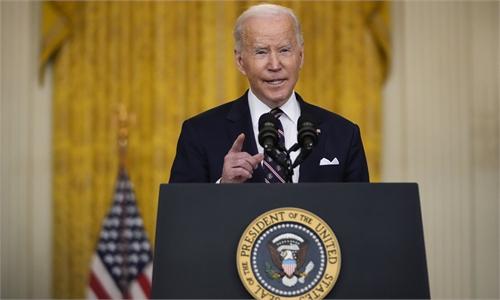
Photo: IC
For years, the West has been seeking out ways to respond to the growing influence of the Belt and Road Initiative (BRI), and the subject is expected to be raised again at the upcoming Group of Seven (G7) summit, which is scheduled to be held from June 26 to 28 in Germany.US President Joe Biden will launch a global infrastructure initiative to provide an alternative to what the Chinese are offering, which is set to be announced at the G7 summit, US National Security Advisor Jake Sullivan said, according to a Bloomberg report on Friday.
If the G7 countries are truly interested in infrastructure construction and promoting the economic development in the Asia-Pacific region, they are of course welcome to propose a new initiative to facilitate a regional infrastructure agenda. But the key questions remain: Does G7 really have the will to do so? How capable are they of delivering on promises?
So far, none of the ideas and programs the G7 countries proposed, jointly or respectively, as an alternative to the BRI has made much progress. At last year's G7 summit, G7 leaders came up with the Build Back Better World (B3W) initiative, another US-led partnership among G7 countries that sought to boost investment in the infrastructure needs of developing countries. Obviously the B3W failed, or there wouldn't be a need to announce a similar framework at this year's G7 summit.
In fact, the main reason why the US has again and again teamed up with other Western countries to launch high-profile infrastructure initiatives to compete with the BRI is to expand its own influence and thus open markets to American companies. They don't really care whether these plans are implemented or not.
If the G7 cared about the real needs of developing countries, they should already have had similar program in place to help developing economies a long time ago. Now it is only because they fear the BRI will gain too much influence, they rushed in to offer plans to compete with the BRI. But the irony is that these Western infrastructure plans generally ended up only paying lip service, revealing their hypocrisy toward the developing world.
With the G7's share of the global economy declining from over 60 percent in the 1980s to about 40 percent at present, the group's ability to control and influence the global economic and trading system is waning. Indeed, even if the G7 countries did have the will to support infrastructure development in developing countries, their own economies would not allow it.
In the UK, the economy just reported a second consecutive monthly contraction for April, with its inflation running high at 9 percent. The Organization for Economic Cooperation and Development predicted that the UK economy would be the worst performer among major economies next year, recording zero growth.
In the US, after the Fed announced its largest interest rate increase in more than a quarter of a century to curb inflation, economists see growing chance of a US recession next year, with inflation remaining high.
In the context of the pandemic, the Russia-Ukraine conflict, among others sources of volatility, the global economy is facing difficulties. Under such circumstances, any geopolitical games that would only be counterproductive for the global economy should be avoided.
It would probably be the biggest contribution the G7 can make to the current world economy if they focused on getting their economies right instead of engaging in geopolitical confrontation and disrupting global economic activities.



